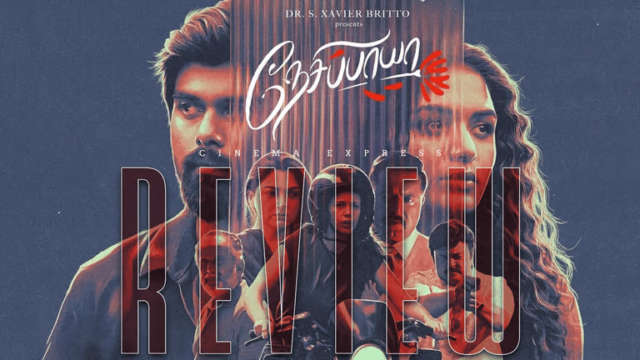Despite a promising premise, the film struggles with pacing issues, unconvincing emotional arcs, and a lack of depth in its romance
Even in a war film like Shershaah, Vishnu Varadhan handled the romance in a way that left an indelible impression on our hearts. So, expectations were naturally high when he forayed into full-fledged romance with Nesippaya. However, the director struggles to meet the mark he had set with Shershaah. With a love story which turns into a crime drama set in a foreign land, Vishnu Varadhan has tried to pull out all the stops to ensure that Nesippaya is a unique addition to the romance genre. However, with a familiar romance plotline, and underwhelming screenplay, the film leaves a lot to be desired.
Director: Vishnu Varadhan
Cast: Akash Murali, Aditi Shankar, Kalki Koechlin, Sarath Kumar, Khushbhu Sundar
Nesippaya tells the story of Arjun (Akash Murali) and Diya (Aditi Shankar), college-sweethearts-turned-ex-lovers who reunite because the latter is framed for a murder. How Arjun, along with Indrani (Kalki Koechlin), attempts to prove her innocence forms the rest of the story. Arjun and Diya’s love story is generic enough for even a supporting character (played by Vikkals Vikram) to casually remark, “They fell in love, but then they broke up, and that’s what happened..” Arjun falls head over heels in love when he sees Diya’s dance performance in college. What starts out as a typical love story, eventually develops into a fairly distinct narrative as Vishnu brings freshness with his unique directorial style. Akash as Arjun portrays a hopeless romantic who can’t help but let an ‘I love you’ spill out of his mouth every now and then. His clinginess, complemented by earnest love, is contrasted with Diya’s untrusting nature due to her past baggage and her inclination for practicality. The couple is the exact opposite of a match made in heaven, and yet, as love is blind, sparks fly, and they fall in love.
When it comes to the reason for their breakup, the director brings more than just their contrasting personalities to the table. While Arjun is all in for the love of his love, delivering delightfully cheesy lines like, “Nee keta na, I’ll even stop the world,” Diya’s suffocation in the relationship is equally valid. Reminding one of Brinda’s Hey Sinamika, Diya’s need for personal space and boundaries in a relationship is a problem that not many couples on screen acknowledge. With this writing nuance taking the film up to a crescendo, Nesippaya falls back to underwhelming territory as it misses out on one key area. After their breakup, Arjun and Diya go about their lives in Chennai and Portugal, respectively, and seem to have moved on without any regrets. Yet, the minute Arjun sees Diya in trouble, he makes an impulsive decision to go to her, leaving his future and career at stake. While Arjun is described as a spontaneous person throughout the film, the fact that they didn’t contact each other for two years makes it difficult for us to accept how much they still care for each other. Such writing issues cause an emotional disconnect, which makes it difficult for us to root for the couple.
Casting Kalki in the role of Indrani is undoubtedly one of Vishnu’s best decisions for Nesippaya. Kalki as Indrani steals the show. In the latter half of the film, Akash often gets into trouble. In such scenarios, generally, the female lead of the film takes it as her responsibility to mend his ways. Here, Indrani is entrusted with the task, as she is like the older sister who constantly monitors his foolhardy decisions and rebukes them with dialogues like, “Nee chumma irukave maatiya. Diya unna vittu ponadhu la thappey ella.” Her character acts as an audience surrogate, reflecting our frustration with Arjun’s impulsive decisions.
Vishnu’s decision to portray Arjun as an ordinary man, steering clear of larger-than-life heroics, is a breath of fresh air. While it has become customary for filmmakers to bestow every male lead with an over-the-top heroic transformation, Arjun feels refreshingly real—much like Kathiravan from Kadhalum Kadandhu Pogum, a character who faces more defeat than victories in fights. This is why the two scenes where Arjun is elevated beyond his usual self end up as the film’s most frustratingly drawn-out portions. The second half of Nesippaya meanders toward its conclusion, weighed down by an over-reliance on Arjun to find solutions, even when they verge on implausibility—despite Indrani being the designated lawyer. To make matters worse, the film occasionally succumbs to commercial cliches, like cutting to a song post a fight scene, at moments when the audience is eager for plot progression. On the editing front, trimming at least two fight sequences would have delivered a much tighter and more engaging cinematic experience.
In the end, Nesippaya tries to craft an everlasting tale of romance, but its inconsistencies make it feel more like a forgettable affair. For all its noble intentions, Nesippaya struggles to transcend its safe tropes and predictable beats. It reminds us that love stories, much like love itself, require more than effort—they demand conviction, depth, and a touch of magic.
News Credits: Cinema Express










